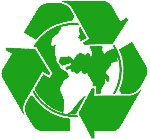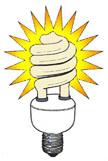


Practical help on Ecological Living | FAQ's | Eco-Friendly Yards |
|||||
|---|---|---|---|---|---|
For specific practical advice for the environmentally concerned, we recommend QEW's popular booklet, Walking Gently on the Earth, an Earthcare Checklist, and QEW's tri-fold pamphlet, Living Lightly on the Earth—In the City. A good beginner's guide is the classic, 50 Simple Things You Can Do to Save the Earth (Earthworks Press, 1989). A more advanced resource is The Consumer's Guide to Effective Environmental Choices by Michael Brower and Warren Leon (New York: Three Rivers Press, 1999). Their focus is on the personal choices that have the greatest potential for long impact on the planet—housing, diet, transportation, and family size. (However, we don't fully agree with the authors' conclusion that we therefore need not "sweat the small stuff," such as paper versus plastic shopping bags or cloth diapers versus disposables. Even the smallest changes in habits can raise consciousness and create a sense of personal empowerment. And when enough people commit to making even small changes in their lives the impact can be surprisingly large.) It's all just common sense, right? Well, in a technologically complex world, the best course may not always be resolved with "common sense." For example: Trade in your older model car for a new clean, super-efficient hybrid? The energy and resources used in building a new car have to be figured into the long-range savings. Meanwhile, if someone else takes over driving your old car, wasting fuel and polluting the air in the process, the benefit is less. It may be better in some cases to keep your old car tuned up and stretch out its useful life, while finding ways to minimize using it (better trip planning, carpooling, bicycling, moving closer to work, etc.)
Put solar collectors on your roof? The energy and resources consumed in manufacturing the collectors and controls must be considered in the net energy savings. Before considering such an ambitious step, reduce your energy requirements through weatherization, furnace replacement, turning down the thermostat and wearing a sweater, simplifyng your life, etc. Buy organic? When we choose organically grown products, we "vote" for healthier soil and reduced toxics in the soil, water, and air. But many organic products are shipped long distances, consuming lots of non-renewable energy and contributing to global warming. In some situations, it may be better for the earth to seek out local suppliers, while encouraging them to shift to more ecologically responsible methods. Participate in community recycling programs? If your community has curb-side pickup for recycables, go ahead and drop your used cans, bottles, and papers into the blue bins. But if you're doing this only because it makes you feel less guilty about not doing enough "for the environment," then maybe it's not that critical. After all, much of the collected "recycling" materials goes into making lower-grade products rather than replacing virgin materials. Recycling programs have helped to extend the life of landfills, but other important environmental problems, such as global warming, aren't getting the attention they deserve. As one Friend put it, worrying about running out of landfill space is like worrying about not having enough closet space in your house while ignoring the fact that your roof is on fire! A more effective strategy for dealing with solid waste is to stop making so much of it! There are at least 1001 ways to do this. The only thing we have to lose is our wasteful habits.
Switch to compact fluorescent lights(CFLs)? This one's actually a "no-brainer." You'll have to get used to shelling out five or six times as much as you pay for the old-fashioned incandescents, but CFLs last ten times as long and use only a fourth as much electricity. So each CFL you install in place of an incandescent saves about $35 over the life of that bulb, while keeping significant amounts of greenhouse gases out of the atmosphere. Do you have some eco-tips like these to pass on? Send them, and maybe we'll post some of them here...info@quakerearthcare.org |



